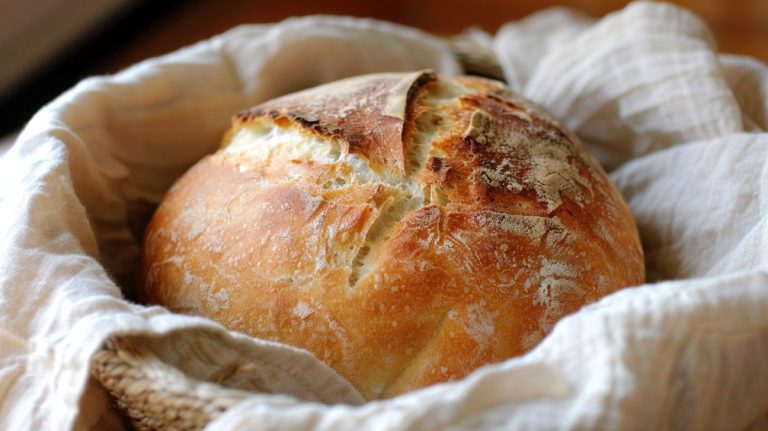Does Sourdough Bread Contain Probiotics?
Sourdough bread doesn’t contain live probiotics because the baking process destroys them. However, its fermentation process offers considerable gut health benefits.
The beneficial bacteria and wild yeasts break down phytic acid and facilitate the formation of prebiotics. These prebiotics nourish the beneficial bacteria in your gut, promoting better digestion and nutrient absorption.
Lactic acid produced during fermentation also improves the bread’s digestibility and lowers its glycemic index. While you won’t get live probiotics from sourdough, the prebiotics and other fermentation benefits make it a nutritious choice.
Explore further to understand how sourdough can enhance your dietary regimen.
Key Takeaways
- Sourdough fermentation promotes beneficial bacteria growth, but baking destroys live probiotics.
- Sourdough bread contains prebiotics that support a healthy gut microbiome.
- Prebiotics in sourdough nourish beneficial gut bacteria, aiding digestion.
- Despite lacking live probiotics post-baking, sourdough offers gut health benefits through prebiotics.
- Heat from baking eliminates probiotics in sourdough, but prebiotics remain intact.
Getting to Know Sourdough Fermentation
Understanding sourdough fermentation begins with recognizing how beneficial bacteria like lactobacillus break down phytic acid and enhance the bread’s nutritional value. The fermentation process involves a symbiotic relationship between wild yeasts and these beneficial bacteria. Lactobacillus, particularly, plays a pivotal role in this process.
As lactobacillus ferments the dough, it breaks down phytic acid, a naturally occurring compound in grains that can inhibit mineral absorption. By reducing phytic acid levels, the fermentation process makes essential minerals like iron, zinc, and magnesium more bioavailable, thereby enhancing the bread’s nutritional profile.
Furthermore, these beneficial bacteria contribute to improved digestion. As they ferment the dough, they produce lactic acid, which not only imparts the characteristic tangy flavor of sourdough but also aids in breaking down complex carbohydrates. This makes the bread easier to digest and helps in maintaining a stable blood sugar level.
Even though the probiotics may not survive the baking process, prebiotics remain intact in the finished bread. Prebiotics serve as food for the beneficial bacteria in your gut, promoting a healthy gut microbiome.
Probiotic Presence in Sourdough
When you bake sourdough bread, the heat destroys live probiotics, but the fermentation process still benefits your gut health.
Fermentation promotes the growth of beneficial bacteria in your gut and enhances nutrient absorption and digestion.
Despite the absence of live probiotics, sourdough bread contributes to a healthy gut microbiome through its prebiotic content.
Probiotics in Baking Heat
High baking temperatures in sourdough bread often destroy the probiotics present in the starter. Although the sourdough starter is rich in beneficial bacteria and yeasts, the baking heat typically reaches levels that these probiotics can’t survive. As a result, the baking process significantly reduces their presence in the finished bread.
Here are some key points to note:
- Probiotics and Baking Heat: Probiotics, which are heat-sensitive, get eliminated during the baking process.
- Beneficial Bacteria Survival: The beneficial bacteria in sourdough starter aren’t heat-resistant and hence don’t survive high baking temperatures.
- Fermentation Benefits: The fermentation process does enhance the flavor and texture of sourdough bread, even if it reduces probiotic content.
- Probiotics vs. Prebiotics: While sourdough bread may lack live probiotics after baking, it does contain prebiotics, which support gut health.
- Effective Probiotic Consumption: Consuming sourdough bread for its probiotic benefits may not be effective due to the heat involved in baking.
Understanding the limitations of probiotics in sourdough bread helps you make informed dietary choices. While the fermentation process in sourdough offers other health benefits, the actual probiotic content is minimal post-baking.
Fermentation Benefits for Gut
Despite the absence of live probiotics, the fermentation process in sourdough bread provides significant benefits for gut health. During fermentation, lactic acid bacteria play an essential role in breaking down the dough. These beneficial bacteria produce lactic acid, which enhances the bread’s digestibility and nutrient absorption. Although the baking heat destroys live probiotics, the pre-digestion of nutrients by lactic acid bacteria can still support a healthy gut microbiome.
The fermentation process reduces antinutrients like phytic acid, which can inhibit mineral absorption. This makes sourdough bread more nutritious and easier on your digestive system. The lowered phytic acid levels allow your body to absorb essential minerals like magnesium and zinc more efficiently, contributing to overall gut health.
While sourdough isn’t a direct source of live probiotics, incorporating other fermented foods into your diet can complement its benefits. Yogurt, kefir, sauerkraut, and kimchi are excellent sources of live probiotics that actively promote a balanced gut microbiome. By combining these fermented foods with sourdough bread, you can enhance your gut health, benefiting from both the probiotics in fermented foods and the improved nutrient absorption facilitated by sourdough’s fermentation process.
Impact of Baking on Probiotics
Baking sourdough bread at high temperatures unfortunately kills the probiotics present in the sourdough starter. Probiotics are live beneficial bacteria that support gut health and digestion. These bacteria thrive during the fermentation process but are unable to survive the intense heat of baking.
However, the fermentation process itself still offers several benefits:
- Improved digestibility: The fermentation breaks down complex carbohydrates and antinutrients, making the bread easier to digest.
- Enhanced flavor: The long fermentation process develops a rich, tangy flavor profile unique to sourdough.
- Better nutrient absorption: Fermentation increases the availability of minerals like iron, zinc, and magnesium.
- Lower glycemic index: Sourdough bread has a slower impact on blood sugar levels compared to other breads.
- Reduced phytic acid: Fermentation decreases phytic acid, which can inhibit nutrient absorption.
While the baking process eliminates probiotics, you can still enjoy sourdough bread for its other health benefits. If you’re looking to boost your probiotic intake, consider incorporating other fermented foods like yogurt or kefir into your diet alongside sourdough bread.
This way, you can enjoy the best of both worlds: the nutritional advantages of sourdough and the gut health benefits of probiotics.
Prebiotics in Sourdough
While sourdough bread doesn’t retain live probiotics after baking, it still provides prebiotics that nourish beneficial gut bacteria and support a healthy digestive system. The fermentation process in sourdough is vital here. During fermentation, compounds that act as prebiotics are formed, feeding the beneficial bacteria in your gut and promoting a balanced microbiome.

Here’s a quick look at how sourdough contributes to gut health:
| Component | Function | Benefit |
|---|---|---|
| Fermentation | Creates prebiotics | Enhances gut health |
| Prebiotics | Nourish beneficial bacteria | Supports digestion |
| Balanced Microbiome | Promoted by prebiotics in sourdough | Improved gut health |
| Digestion | Supported by the prebiotics | Better nutrient absorption |
| Nutrient Absorption | Enhanced by a healthy gut | Overall well-being |
Consuming sourdough can notably benefit your digestion. Prebiotics from sourdough act as food for beneficial bacteria, aiding in nutrient absorption and sustaining a healthy gut. Even without live probiotics, the prebiotics present in sourdough guarantee your digestive system functions smoothly.
Incorporating sourdough into your diet is a delightful way to support gut health through prebiotics, providing essential nourishment for your beneficial bacteria and enhancing overall digestion.
Gut Health Benefits
You may not get live probiotics from sourdough bread, but its fermentation process enhances digestion.
The prebiotics in sourdough nourish your gut’s beneficial bacteria, promoting overall gut health.
Opting for whole-grain sourdough can offer even greater benefits compared to white flour varieties.
Fermentation Enhances Digestion
The fermentation process in sourdough bread greatly enhances digestion and nutrient absorption, making it a valuable addition to a gut-friendly diet. This is primarily due to the natural yeast and lactic acid bacteria that play a pivotal role in sourdough’s fermentation. These microbes aid in gluten breakdown, making the bread easier to digest. As a result, you’ll likely experience fewer digestive issues compared to consuming non-fermented bread.
Here are some key benefits of sourdough fermentation for digestion and gut health:
- Enhanced Nutrient Absorption: Fermentation helps break down anti-nutrients, making minerals like iron and zinc more available for absorption.
- Improved Digestibility: The natural yeast and lactic acid bacteria partially digest the gluten, reducing the load on your digestive system.
- Reduced Phytic Acid: Fermentation lowers phytic acid levels, which can inhibit nutrient absorption.
- Better Blood Sugar Control: The fermentation process lowers the glycemic index of bread, helping to maintain stable blood sugar levels.
- Increased Lactic Acid: This promotes a favorable gut environment, supporting overall gut health.
Prebiotics Promote Gut Health
In addition to enhancing digestion, sourdough bread offers prebiotics that nourish beneficial bacteria in your gut, promoting overall gut health. While it’s true that the baking process eliminates live probiotics, the prebiotic fibers found in sourdough bread still play a pivotal role in fostering a healthy gut environment.
These prebiotics serve as food for the beneficial bacteria already residing in your digestive system, encouraging their growth and activity.
By consuming sourdough bread, you’re contributing to a balanced gut microbiota, which is essential for maintaining peak gut health. Studies have shown that a diet rich in prebiotics can improve the diversity and function of gut bacteria, leading to better digestion and a stronger immune system. This makes sourdough bread a valuable addition to your healthy eating regimen.
Incorporating sourdough bread into your diet can also help mitigate some digestive issues, such as bloating and irregular bowel movements, by supporting the beneficial bacteria in your gut. So, even though sourdough bread may not provide live probiotics, its prebiotic content guarantees that it still offers significant gut health benefits.
Comparing to Other Fermented Foods
While sourdough bread offers unique digestive benefits through its fermentation process, it doesn’t provide live probiotics like sauerkraut or kimchi do. Fermented foods such as these are rich in live probiotics, which are essential for gut health. When you consume sauerkraut or kimchi, you’re getting a healthy dose of these live microorganisms that help balance your gut flora.
In contrast, the baking process of sourdough bread kills the live probiotics initially present during fermentation. However, this doesn’t mean sourdough is without benefits. The lactic acid produced during fermentation breaks down phytic acid, which aids digestion and increases nutrient availability. When opting for sourdough, whole grain or rye sourdough varieties offer more gut-healthy benefits compared to white flour sourdough.
Here are some key points to bear in mind:
- Sauerkraut and kimchi contain live probiotics beneficial for gut health.
- Sourdough bread aids digestion but lacks live probiotics after baking.
- Whole grain or rye sourdough offers more benefits than white flour sourdough.
- Probiotics from fermented foods balance gut flora.
- Lactic acid in sourdough improves nutrient absorption.
Choosing a variety of fermented foods can help you maintain a healthy gut.
Nutritional Value of Sourdough
Sourdough bread, despite lacking live probiotics post-baking, offers significant nutritional advantages worth considering. The fermentation process in sourdough involves lactic acid bacteria, which produce organic acids and break down phytic acid. This results in easier digestion and improved nutrient absorption, particularly minerals, due to the reduced phytic acid levels.
Moreover, sourdough fermentation enhances the availability of prebiotics, which support the growth of beneficial gut bacteria. While sourdough may not contain probiotics after baking, it aids your digestive health by fostering a gut environment conducive to beneficial microbes.
| Nutrient | Conventional Bread | Sourdough Bread |
|---|---|---|
| Phytic Acid | High | Low |
| Digestibility | Moderate | High |
| Mineral Absorption | Lower | Higher |
| Prebiotics | Low | High |
The organic acids produced by the acid bacteria in sourdough also contribute to its unique tangy flavor and extended shelf life. These acids, along with the fermentation process, help lower the glycemic index of the bread, offering additional health benefits such as better blood sugar control. So, while sourdough doesn’t contain probiotics, its nutritional profile is robust, making it a valuable addition to your diet.
Making and Buying Sourdough
When you start making sourdough at home, you’ll need a sourdough starter, a mixture of flour and water that’s fermented over time. This starter is essential to the fermentation process, which breaks down phytic acid, enhancing the bread’s nutritional profile.
When purchasing sourdough, here are a few tips to make sure you’re getting a quality product:
- Check for a genuine sourdough starter: Authentic sourdough should have a natural starter, not commercial yeast.
- Look for whole grain or rye bread: These options offer additional health benefits due to higher fiber content.
- Read the ingredient list: Avoid loaves with added sugars or preservatives.
- Consider the fermentation duration: Longer fermentation can enhance digestibility and nutrient absorption.
- Support local bakeries: They often use traditional methods and higher-quality ingredients.
Incorporating sourdough, especially whole grain or rye bread, into your diet can offer health benefits, even if it doesn’t contain live probiotics. The fermentation process still plays an essential role in making the bread more nutritious and digestible.
Frequently Asked Questions
Is Sourdough Bread Good for Gut Bacteria?
Yes, sourdough bread is good for gut bacteria. While it doesn’t contain live probiotics, its prebiotics support beneficial gut bacteria, and its fermentation process enhances digestion and nutrient absorption, promoting overall gut health.
What Bread Has the Most Probiotics?
When considering bread with the most probiotics, you’ll find that most breads, including sourdough, lack live probiotics due to baking temperatures. Instead, focus on fermented foods like kimchi or yogurt for a probiotic boost.
How Much Probiotic Is in Sourdough Bread?
Did you know over 80% of probiotics in sourdough don’t survive baking? While the heat kills most, sourdough still offers prebiotics and nutrients that support gut health. Pair it with probiotic-rich foods for best benefits.
What Is the Best Bread for Your Gut?
For best gut health, choose whole grain or rye sourdough bread. Its fermentation process breaks down phytic acid, supports digestion, and retains prebiotics. Moderation is key to harnessing these gut-friendly benefits effectively.
Gut-Friendly Benefits Without the Probiotics
So, you’re thinking sourdough‘s your ticket to probiotic paradise? Think again. While it’s packed with prebiotics and boasts some gut health benefits, the baking process pretty much nukes any live probiotics.
But hey, don’t worry—sourdough’s still a nutritional gem compared to that cardboard you call store-bought bread. Just don’t expect it to replace your kombucha or yogurt in the probiotic department.
Enjoy it for what it is: delicious and nutritious, but not exactly a probiotic powerhouse.







